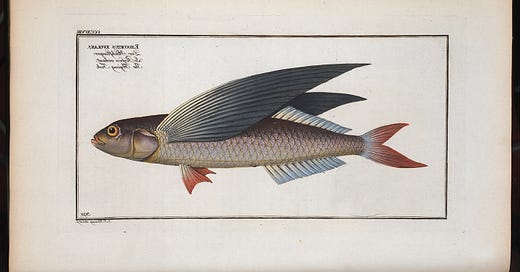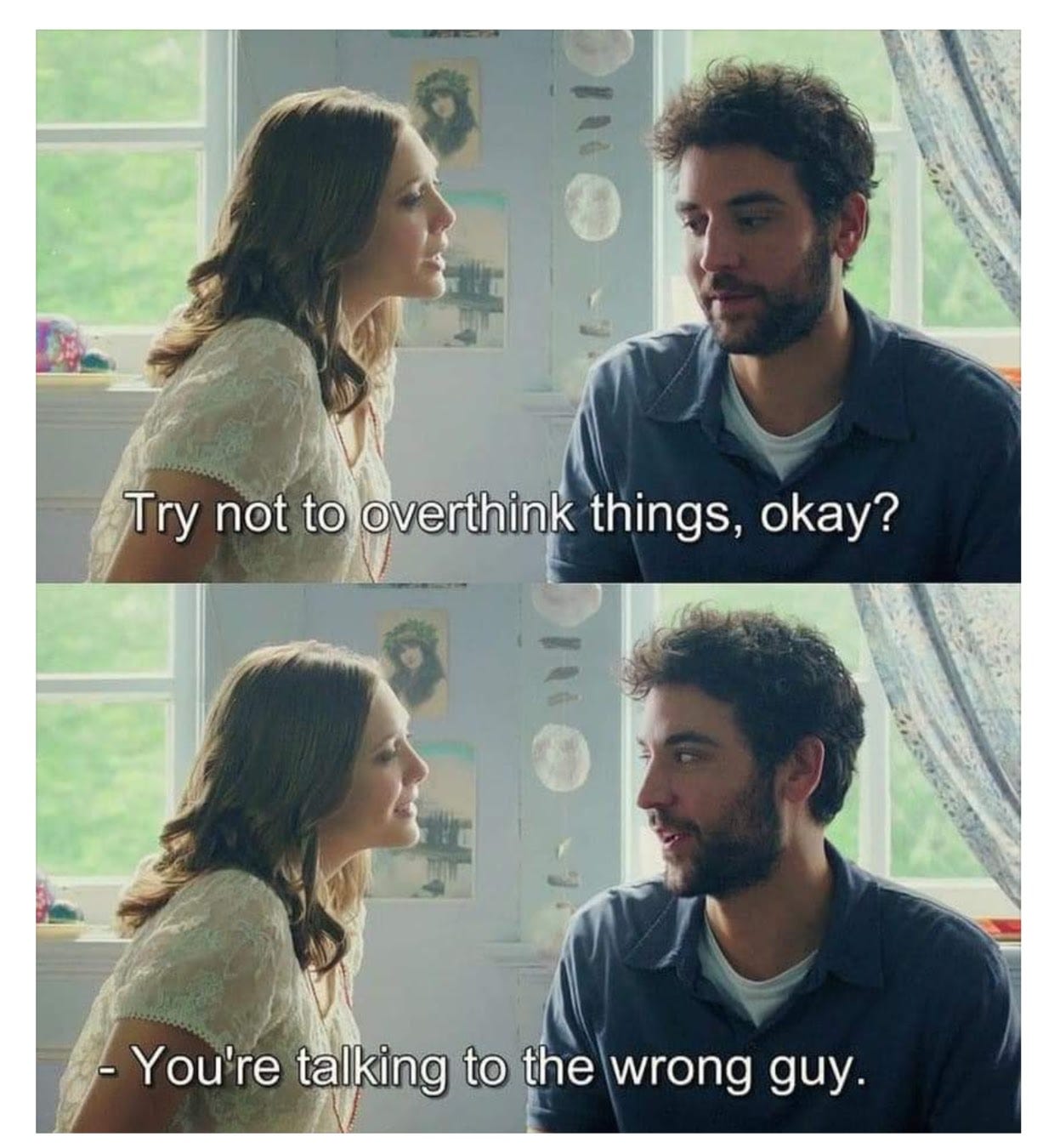Hallo, Leidensgefährte/Leidensgefährtin. How goes it, socii malorum? What’s new, mon compagnon de misères, my Fellow Sufferer. Tomasz Goetel here.
There anything we have in common, you and I? Do you, my Esteemed Reader, live in the worst of all possible worlds? Like I do? Or, do we share only the condition “that we have nothing in common” (Jean-Luc Nancy)?
I intend to write The Flying Fish firstly because writing has been necessary for me to be able to “relieve my own troubled mind, and possibly also to comfort others” (Antonio Rosmini). I must find relief from thinking things that trouble me.1
In my dream world, you wouldn’t be reading this on the internet. We would be sitting around a table, you and I. Perhaps a few other people with us, perhaps five or six of us. And we’d speak out loud about what bothered us, and what about what bothered us we were thinking. We drink a little bourbon and maybe, just maybe, I’d forget that my fundamentally bad nature is characterised by the fact that I can’t bear begin closely scrutinised. But now’s not the time to digress.
Back to thinking things that trouble me. My writing of The Flying Fish comes from my thinking. What is it that I call “thinking”? That is hard to say with certainty. But, in short, isn’t thinking story-telling and isn’t story-telling logos? Therefore, mediation— thinking is mediation.2
And so, I can either think or I can drown myself.
I think, therefore I write. I write, therefore I think. I think, therefore I read. And, on a good day, I’d hope to perhaps think things through, either to theirs or my own limit. But, on not a good day when I, God help me, re-read my writing, all I see is illaudable blatherskite. The Reader may need a diagram just to find out where the main verb is as he or she wrestles with my foolishness, vanity, inconsistencies, repetitions, biases, misconceptions, fallacies, aah, the one irresistible, to me, argument: the argument ad hominem, wrong assumptions, and many other errors that may be found in my writing here and there, I am sure of it. This does not worry me, because who—apart from myself, with a gun to my head—would be persistent enough to read through the whole thing, anyway? But, just as the giant Houellebecq, that quiet Frenchman, wrote somewhere, I, too, am “conscious of how difficult the simple operation of aligning words and organising them into sentences could be without the whole lot collapsing into incoherence, or sinking into tedium”. So please forgive me, my Fellow Sufferer, forgive me.
Where was I? Oh, yes. Read. Think. Write. Language.
Language. When it comes to language, were I free to paraphrase a little something Karl Kraus gave me as an aphorism, I would say that my language is the common prostitute that I intend to turn into a virgin. Isn’t that a lofty goal?3
Anyways. This humble Substack is nothing without a reader (you), so please, look around and bring the fish to flight. If you have something that you’d like to say, please use the ‘comment’ section below each article, or email the Present Author at tomaszgoe@protonmail.com or send DM at the twitter. I hope that you would comment on my stories because, to quote John Stuart Mill on this subject, “he who knows only his own side of the case, knows little of that”. So, please comment and help me see the light.
No more to you at this time. Humbly craving the continuance of your reading eyes’ honorable favor towards me, and craving th’eternal establishment of your happiness, I humbly take leave.
Yours most affectionate
Tomasz Goetel
Do you think that “growing threats” to the Internet of Things trouble me? They do not. From The New Jerusalem, “cyber security”, “financial asset security”, and the likes, are coming to a device near you and me as we speak. All linked with your and mine “bio-security”, in our biopolitical, palliative, transparent society that is based on new “rules” for each “individual” who must always be a productive and compassionate and self-loving, and an all-loving part of an artificially solidarized “community”. In communitarianism, you and everyone will be “happy”. I will be happy. In communitarianism, each member’s “rights”, including yours, have been “secured” for you and your child—from zygote to organ harvest. Or, perhaps, that’s already happened... Didn’t you send your DNA samples recently somewhere for “testing”? Well, I’m just joking.
What troubles me the most, I suppose, is that I may not only be a witness to but one of the participants in this sad spectacle of the godless, greedy, rationalistically rapist, materialistic, “modern” world. The world is exhausted. Exhausted by its own self and by its own perpetual, ultra-efficient, and cost-effective “creating” of its “future”, and its own signaling of “progress” and “scientific truth” and “technology”, “democracy”, “equality”, “sustainability”, in the service of “minorities” and “humanity” and so on.
A self-exhausted world is gripped by the hands of the faceless fascist transhumanist gangsters whose parents formed a posse a long time ago, a global supranational private “trading” guild, who dictate the rules while pretending to be friends with liberty and to whom the entire spectacular fakery in this wag-the-dog think-tanked world of today is a mean toward obtaining ever more power, profit and property, collaboration and control, data, deviant satisfaction, blackmail from the gathered extortion material, and surely at least one more something as the ultimate goal that I don’t know what it is but, if forced to make an intuitive guess, I’d say it’s got to do with an obsessive hyper-pursuit of ever-elusive avoidance of their own mortality. Tik tok, tik tok, you goddamned scoundrels.
Herr Heidegger, that old pinocchio, tells me “the most thought-provoking thing about our thought-provoking age” is “that we are still not thinking”. He’s probably correct. Miguel de Unamuno says that “to think is to talk with oneself, and each one of us talks with himself, thanks to our having had to talk with one another”. Fair enough, what’s good for Don Miguel is good for me, for sure. But isn’t the thought process itself a religious act? I’d ask Romano Guardini but he’s dead.
I must be speaking carefully, because I’m scared to speak not carefully, because I know that:
“What can be said at all can be said clearly, and what we cannot talk about we must pass over in silence.”—Wittgenstein.
“When I was a child, I spake as a child, I understood as a child, I thought as a child: but when I became a man, I put away childish things.”—Paul, in 1 Cor 13:11, KJV.
“(…) every idle word that men shall speak, they shall give account thereof in the day of judgment. For by thy words thou shalt be justified, and by thy words thou shalt be condemned.”—Matthew 12:36—37, KJV.






